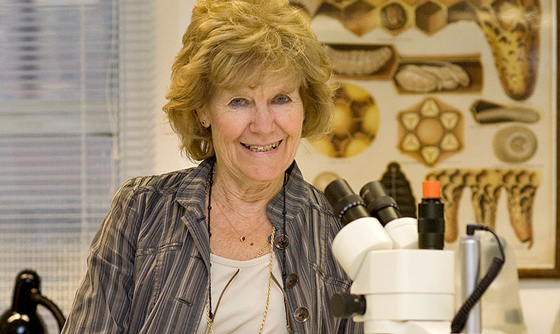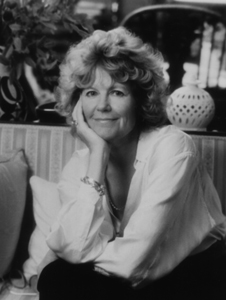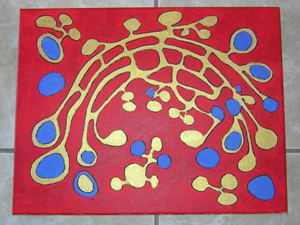
Nancy Jane Lane (MSc’60): Opening the Lab Door
By Mark Campbell
For nearly 25 years, Dr. Nancy Jane Lane (MSc’60), OBE, has been travelling the world encouraging women to consider a future in science. To her, science is not a profession; it’s a calling, a wonderful way of life.
“It’s intellectually absorbing,” says Dr. Lane. “It’s exciting, it’s very social, you have the opportunity to travel the world and the potential to help mankind is great. So whenever the opportunity presents itself to disseminate this message, I take it.”
A leading researcher in cell biology and lecturer at the University of Cambridge, Dr. Lane was raised in an era when science was not considered a suitable career option for women. Yet Dr. Lane followed her heart and, eventually, became a role model and mentor, participating in a variety of initiatives that have broken down barriers and increased the number of women working in the field. There were times when she felt discouraged, and wondered if she was making any headway at all, “but then,” she says, “I meet women who tell me how I inspired them and never to give up, because what I do is important to them.”
Originally from Halifax, it was Mother Nature – specifically the Atlantic Ocean – that nurtured Dr. Lane’s interest in science. “The sea is full of lovely invertebrates such as clams, mussels, lobsters and starfish. When we think of animals, we tend to think of dogs and cats, but there’s a whole other world under the sea.”
Dr. Lane knew she wanted to study that world, but her career advisor at Queen Elizabeth High School dismissed such notions. “The advisor said girls can’t be scientists; they can only be lab technicians. That’s like being in a kitchen and not being allowed to cook. I thought, ‘I’ll try to show you that I can be a proper scientist.'”
A supportive environment
She would find a much more supportive academic environment at Dalhousie University, which she chose because it had offered her a rather generous scholarship and enabled her to live at home. “I did well and the fact I was a girl was never held against me,” says Dr. Lane. “There was no reluctance to consider me as a potential scientist.”
She also found a mentor and inspiration in Professor Dixie Pelluet, who taught courses in invertebrate zoology and genetics. “She was a remarkable educator and very supportive. To see a woman teaching at a university at that time was somewhat rare, so in that way she was a role model for me.”
 Upon graduation, Dr. Lane was awarded an Imperial Order of the Daughters of the Empire scholarship and was accepted at Oxford University for doctorate studies, an opportunity she says was made possible in part by Dalhousie. “I was told by the Zoology Department at Oxford that they couldn’t turn me down because I had earned the Governor General’s Gold Medal for the top marks in the final exams at Dalhousie, so the university enabled me to achieve admission to Oxford.”
Upon graduation, Dr. Lane was awarded an Imperial Order of the Daughters of the Empire scholarship and was accepted at Oxford University for doctorate studies, an opportunity she says was made possible in part by Dalhousie. “I was told by the Zoology Department at Oxford that they couldn’t turn me down because I had earned the Governor General’s Gold Medal for the top marks in the final exams at Dalhousie, so the university enabled me to achieve admission to Oxford.”
In stark contrast to Dalhousie, Dr. Lane did not find Oxford quite as friendly, at least not based on her male colleagues in the Zoology departmental laboratory. “One had always to exhibit confidence in oneself, otherwise you were not well regarded. I used to think of myself as having an external carapace behind which I hid my anxieties. But years later, Oxford male classmates told me they had been frightened of me. There were not many women doing graduate studies in Oxford at that time, especially in science.”
Following post-doctoral work at the Albert Einstein College of Medicine in New York and Yale University, Dr. Lane was hired by the University of Cambridge in 1968 and has been a lecturer and researcher there ever since. Her focus is cell biology, not just the internal structure of cells, but also how they connect to one another in organisms. As she notes, when cells lose the ability to hold themselves together, they become migratory and form tumors, so research such as this is vital in the field of cancer prevention and treatment.
“In this research, you’re standing on the shoulders of giants,” observes Dr. Lane. “Unless you’ve won a Nobel Prize, it’s difficult to pin down how you’ve made a difference. But I like to think my work is contributing to and advancing our understanding of such diseases.”

Dr. Lane is not just a researcher of cellular structures; she paints them. Some of her paintings have appeared on the covers of scientific journals and David Hockney selected several for inclusion in the Royal Academy of Arts’ Summer Exhibition in 2005. “That was exciting,” says Dr. Lane, who had once earned a scholarship at the Nova Scotia College of Art and Design. “It was an opportunity to show the beauty of the ultrastructure of the tiny cells of which we are all composed.”
A remarkable career
If Dr. Lane’s advances in understanding cell biology are hard to pinpoint, there is no mistaking her achievements in encouraging more women to pursue a scientific career. At the invitation of then Prime Minister John Major, she chaired the committee that published The Rising Tide in 1994, a landmark report on opportunities and barriers for women in science, engineering and technology (SET). She also co-founded The Athena Project, which, by virtue of its Silver award, now determines whether universities can apply for research grants based on their record of recruiting, retaining and promoting women in SET positions. And she established WiSETI – the Women in Science, Engineering and Technology Initiative at Cambridge in 1999, which promotes and supports women in achieving SET positions at the university.
“There are so many of the young floundering today, and they all have the potential to make a difference. They just need to be inspired. Science is a way to do that, but we need to raise more awareness of its excitement as a career. So I visit schools and universities, write articles – whatever I can do to communicate that message.”
And if her legacy rests on her efforts to encourage more women to enter the field and not her particular advances in cellular biology, she has no complaints. “Women are just as clever and capable as their male counterparts. So to see evidence that the barriers are coming down and to see an increasing number of women employed as scientists, well, that’s a wonderful legacy to have.”